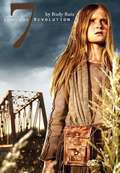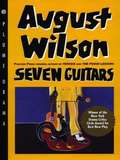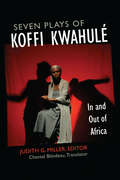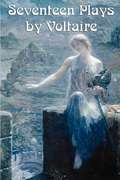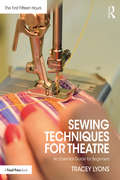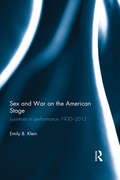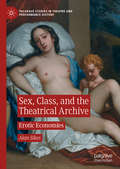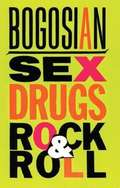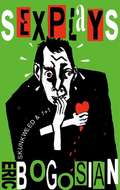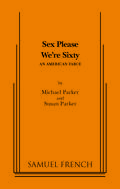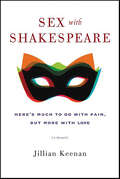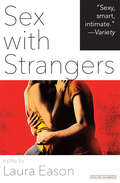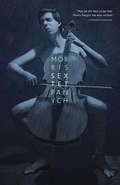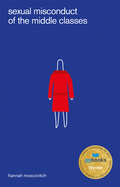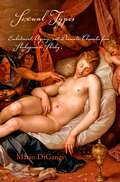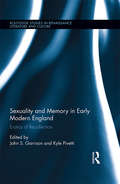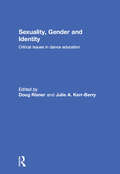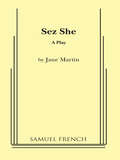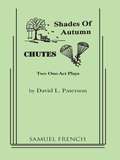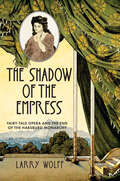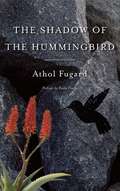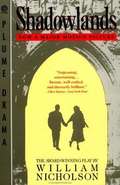- Table View
- List View
Seven for the Revolution
by Rudy RuizA young Latina struggles to communicate with her immigrant grandfather when her mother prohibits her from speaking Spanish. <P><P>A boy grapples with the slippery nature of laws, rules and ambition along the US-Mexico border in his quest for the American Dream. <P><P>An elderly woman's land, life and loyalties are divided by a controversial border fence. <P><P>A South American immigrant encounters racism and love in an LA elevator as turmoil swirls around a radical change in immigration policy. <P><P>In post-apocalyptic New York, a Latina fights to defend the last vestiges of a nation's pride as disgruntled creditors threaten to confiscate the Statue of Liberty.
Seven Guitars
by August WilsonFull Length, Tragic comedy Characters: 4 male, 3 female Exterior Set The sixth in the author's decade by decade exploration of the black experience in America, two of which have won Pulitzer Prizes, Seven Guitars is part bawdy comedy, part dark elegy and part mystery. In the backyard of a Pittsburgh tenement in 1948, friends gather to mourn for a blues guitarist and singer who died just as his career was on the verge of taking off. The action that follows is a flashback to the busy week leading up to Floyd's sudden and unnatural death. "Displays a narrative sweep and almost biblical richness of language and character. . . . Mr. Wilson writes so vividly that the play seems to have the narrative scope and depth of a novel. "-The New York Times. "Impressive . . . with wild, untamed elements of symbolic fantasy, and the language . . . is used with the specific riff like fluency and emotional impact of jazz. "-New York Post. Winner of the N. Y. Drama Critics Award for Best Play.
Seven Plays of Koffi Kwahulé: In and Out of Africa
by Chantal Bilodeau Judith G. MillerThe work of renowned Ivoirian playwright Koffi Kwahulé has been translated into some 15 languages and is performed regularly throughout Europe, Africa, and the Americas. For the first time, Seven Plays of Koffi Kwahulé: In and Out of Africa makes available to an Anglophone audience some of the best and most representative plays by one of Francophone Africa’s most accomplished living playwrights. Kwahulé’s theater delves into both the horror of civil war in Africa and the diasporic experience of peoples of African origin living in Europe and the “New World.” From the split consciousness of the protagonist and rape victim in Jaz to the careless buffoonery of mercenaries in Brewery, Kwahulé’s characters speak in riffs and refrains that resonate with the improvisational pulse of jazz music. He confronts us with a violent world that represents the damage done to Africa and asks us, through exaggeration and surreal touches, to examine the reality of an ever-expanding network of global migrants. His plays speak to the contemporary state of humanity, suffering from exile, poverty, capitalist greed, collusion, and fear of “the other”—however that “other” gets defined. Judith G. Miller’s introductory essay situates Kwahulé among his postcolonial contemporaries. Short introductory essays to each play, accompanied by production photos, contextualize possible approaches to Kwahulé’s often enigmatic work. Anglophone theater scholars and theater professionals eager to engage with contemporary theater beyond their borders, particularly in terms of what so-called minority theater artists from other countries are creating, will welcome this indispensable collection. Students and scholars of African studies and of global French studies will also find this work intriguing and challenging.
Seventeen Plays by Voltaire
by VoltaireA collection containing Alzire, Amelia, Brutus, Caliline, Mahomet, Mariamne, Merope, Nanine, Oedipus, Olympia, Orestes, Pandora, Semiramis, Socrates, The Orphan of China, The Prude, & The Scotch Woman.
Sewing Techniques for Theatre: An Essential Guide for Beginners
by Tracey LyonsSewing Techniques for Theatre: An Essential Guide for Beginners distills the intimidating art of sewing down into simple, quick, and effective lessons to prepare readers for an entry-level position in a costume shop. The lessons follow an hour-by-hour structure, offering detailed instructions to creating 11 sewing samples, a scrub shirt, and a tote bag. Embedded in the projects’ directions are lecture materials on safety, irons, fabric, and patterns. With a wealth of hands-on exercises, review questions, photographs, and step-by-step instructions for compiling a portfolio, this guide teaches aspiring costume technicians about the culture and machinery of the costume shop, and equips them with the necessary skills to begin their career as members of a costume shop team.
Sex and Aesthetics in Samuel Becketts Work (New Interpretations of Beckett in the Twenty-first Century)
by Paul StewartThis book places sex and sexuality firmly at the heart of Beckett. From the earliest prose to the late plays, Paul Stewart uncovers a profound mistrust of procreation which nevertheless allows for a surprising variety of non-reproductive forms of sex which challenge established notions of sexual propriety and identity politics.
Sex and War on the American Stage: Lysistrata in performance 1930-2012
by Emily KleinAmerican adaptations of Aristophanes’ enduring comedy Lysistrata have used laughter to critique sex, war, and feminism for nearly a century. Unlike almost any other play circulating in contemporary theatres, Lysistrata has outlived its classical origins in 411 BCE and continues to shock and delight audiences to this day. The play’s "make love not war" message and bawdy humor render it endlessly appealing to college campuses, activist groups, and community theatres – so much so that none of Aristophanes’ plays are performed in the West as frequently as Lysistrata. Starting with the play’s first mainstream production in the U.S. in 1930, Emily B. Klein explores the varied iterations of Lysistrata that have graced the American stage, page, and screen since the Great Depression. These include the Federal Theatre’s 1936 Negro Repertory production, the 1955 movie musical The Second Greatest Sex and Spiderwoman Theater’s openly political Lysistrata Numbah!, as well as Douglas Carter Beane’s Broadway musical, Lysistrata Jones, and the international Lysistrata Project protests, which updated the classic in the contemporary context of the Iraq War. Although Aristophanes’ oeuvre has been the subject of much classical scholarship, Lysistrata has received little attention from feminist theatre scholars or performance theorists. In response, this book maps current debates over Lysistrata’s dubious feminist underpinnings and uses performance theory, cultural studies, and gender studies to investigate how new adaptations reveal the socio-political climates of their origins. Emily B. Klein is Assistant Professor of English and Drama at Saint Mary's College of California. Her work has appeared in Women and Performance and Frontiers as well as Political and Protest Theater After 9/11: Patriotic Dissent (Routledge, 2012).
Sex, Class, and the Theatrical Archive: Erotic Economies (Palgrave Studies in Theatre and Performance History)
by Alan SikesIn Sex, Class and the Theatrical Archive: Erotic Economies, Alan Sikes explores the intersection of struggles over sex and class identities in politicized performances during key revolutionary moments in modern European history. The book includes discussions of sodomitical closet dramas from the decades surrounding the English Glorious Revolution of 1688; the performances of 'Tribades and Amazons', public women of the French Revolution; the 'homophilic elitism' in the early plays of Brecht and Hasenclever from the years just before and after the German Revolution that marked the founding of the short-lived Weimar Republic; and the utopian conception of a Soviet 'New Woman' set to take the stage after the Russian Revolution of 1917. Throughout, Sikes invokes the differences between past and present politicized performances in order to cast our own political imaginings into sharper and more critical relief.
Sex, Drugs, Rock & Roll
by Eric BogosianBogosian explores the dark underbelly of the American dream with blistering prose, trenchant social criticism and breathtakingly accurate characterizations of an astonishing range of his fellow citizens.
Sex Plays
by Eric Bogosian"A born storyteller with perfect pitch."--The New York Times "Greatly and bilaterally talented . . . spiky, stinging, caustic without cauterizing. And funny."--New York One of America's premier performers and most innovative and provocative artists offers his two newest plays: Skunkweed details the culture clash between a Los Angeles screenwriter and a working-class girl and her rural Florida clan in a hotel room, and 1+1 explores desire, greed, and responsibility to others through the lives of an aspiring actress, assistant restaurant manager, and a photographer. About the characters in 1+1, Eric Bogosian recently stated, "Bri, Phil, and Carl are based on people I've found intensely interesting my whole life: a good-looking hustler, an ambitious pretty girl, and a 'good guy' who always seems to finish last. . . . The story is a parable. All my plays are. My plays are not expositions of a specific time and place. Rather, I try to find a way to set them so that the audience can immerse itself in a situation. I don't have answers. I have questions." Eric Bogosian is a writer and actor who has authored five full-length plays and created six full-length solos for himself, including Talk Radio; subUrbia; Sex, Drugs, Rock & Roll; Pounding Nails in the Floor with My Forehead; and Drinking in America. He is the recipient of three OBIE Awards and a Drama Desk Award, and has toured throughout the United States and Europe.
Sex Please We're Sixty
by Michael Parker Susan Parker2m, 4f / Farce / Mrs. Stancliffe's Rose Cottage Bed & Breakfast has been successful for many years. Her Guests (nearly all women) return year after year. Her next door neighbor, the elderly, silver-tongued, Bud "Bud the Stud" Davis believes they come to spend time with him in romantic liaisons. The prim and proper Mrs. Stancliffe steadfastly denies this, but really doesn't do anything to prevent it. She reluctantly accepts the fact that "Bud the Stud" is, in fact, good for business. Her other neighbor and would-be suitor Henry Mitchell is a retired chemist who has developed a blue pill called "Venusia," after Venus the goddess of love, to increase the libido of menopausal women. The pill has not been tested. Add to the guest list three older women: Victoria Ambrose, a romance novelist whose personal life seems to be lacking in romance; Hillary Hudson a friend of Henry's who has agreed to test the Venusia: and Charmaine Beauregard, a "Southern Belle" whose libido does not need to be increased! Bud gets his hands on some of the Venusia pills and the fun begins, as attempts to entertain all three women! The women mix up Bud's Viagra pills with the Venusia, and we soon discover that it has a strange effect on men: it gives them all the symptoms of menopausal women, complete with hot flashes, mood swings, weeping and irritability! When the mayham settles down, all the women find their lives moving in new and surprising directions.
Sex with Shakespeare: Here's Much to Do with Pain, but More with Love
by Jillian KeenanA provocative, moving, kinky, and often absurdly funny memoir about Shakespeare, love, obsession, and spankingWhen it came to understanding love, a teenage Jillian Keenan had nothing to guide her—until a production of The Tempest sent Shakespeare’s language flowing through her blood for the first time. In Sex with Shakespeare, she tells the story of how the Bard’s plays helped her embrace her unusual sexual identity and find a love story of her own.Four hundred years after Shakespeare’s death, Keenan’s smart and passionate memoir brings new life to his work. With fourteen of his plays as a springboard, she explores the many facets of love and sexuality—from desire and communication to fetish and fantasy. In A Midsummer Night’s Dream, Keenan unmasks Helena as a sexual masochist—like Jillian herself. In Macbeth, she examines criminalized sexual identities and the dark side of “privacy.” The Taming of the Shrew goes inside the secret world of bondage, domination, and sadomasochism, while King Lear exposes the ill-fated king as a possible sexual predator. Moving through the canon, Keenan makes it abundantly clear that literature is a conversation. In Sex with Shakespeare, words are love.As Keenan wanders the world in search of connection, from desert dictatorships to urban islands to disputed territories, Shakespeare goes with her —and provokes complex, surprising, and wildly important conversations about sexuality, consent, and the secrets that simmer beneath our surfaces.
Sex with Strangers
by Laura EasonHow far will you go to get what you want? Will you be the same person if you finally do? When star sex blogger and memoirist Ethan, 24, tracks down his idol, the gifted but obscure 40ish novelist Olivia, he finds they each crave what the other possesses. As attraction turns to sex, and they inch closer to getting what they want, both must confront the dark side of ambition and the near impossibility of reinventing oneself when the past is only a click away. Sex with Strangers had its world premiere at Steppenwolf Theatre Company; it will have its New York premiere at Second Stage Theatre in June 2014, directed by David Schwimmer.
Sex with Strangers
by Laura EasonHow far will you go to get what you want? Will you be the same person if you finally do? When star sex blogger and memoirist Ethan, 24, tracks down his idol, the gifted but obscure 40ish novelist Olivia, he finds they each crave what the other possesses. As attraction turns to sex, and they inch closer to getting what they want, both must confront the dark side of ambition and the near impossibility of reinventing oneself when the past is only a click away. Sex with Strangers had its world premiere at Steppenwolf Theatre Company; it will have its New York premiere at Second Stage Theatre in June 2014, directed by David Schwimmer.
Sextet
by Morris Panych"The best script Morris Panych has ever written."?Toronto StarA blizzard strands six musicians in their motel with only their instruments, each other, and their secrets to keep them warm. Where will everyone sleep when everyone is sleeping with everyone else? Morris Panych is internationally recognized as one of North America's master playwrights.
Sexual Misconduct of the Middle Classes
by Hannah MoscovitchThe archetypal student-teacher romance is cleverly turned on its head for the post-#MeToo era in this striking new play by the acclaimed author of What a Young Wife Ought to Know and Bunny. Jon, a star professor and author, is racked with self-loathing after his third marriage crumbles around him when he finds himself admiring a student—a girl in a red coat. The girl, nineteen-year-old Annie, is a big fan of his work, and also happens to live down the street. From their doorways to his office to hotel rooms, their mutual admiration and sexual tension escalates under Jon’s control to a surprising conclusion that will leave you wanting to go back and question your perceptions of power as soon as you finish.
Sexual Politics in the Work of Tennessee Williams
by Michael S. D. HooperMichael S. D. Hooper reverses the recent trend of regarding Tennessee Williams as fundamentally a social writer following the discovery, publication and/or performance of plays from both ends of his career – the 'proletarian' apprentice years of Candles to the Sun and Not About Nightingales and the once overlooked final period of, amongst many other plays, The Red Devil Battery Sign. Hooper contends that recent criticism has exaggerated the political engagement and egalitarian credentials of a writer whose characters and situations revert to a reactionary politics of the individual dominated by the negotiation of sexual power. Directly, or more often indirectly, Williams' writing expresses social disaffection before glamorising the outcast and shelving thoughts of political change. Through detailed analysis of canonical texts the book sheds new light on Williams' work, as well as on the cultural and social life of mid-twentieth-century America.
Sexual Types: Embodiment, Agency, and Dramatic Character from Shakespeare to Shirley
by Mario DiGangiSexual types on the early modern stage are at once strange and familiar, associated with a range of "unnatural" or "monstrous" sexual and gender practices, yet familiar because readily identifiable as types: recognizable figures of literary imagination and social fantasy. From the many found in early modern culture, Mario DiGangi here focuses on six types that reveal in particularly compelling ways, both individually and collectively, how sexual transgressions were understood to intersect with social, gender, economic, and political transgressions.Building on feminist and queer scholarship, Sexual Types demonstrates how the sodomite, the tribade (a woman-loving woman), the narcissistic courtier, the citizen wife, the bawd, and the court favorite function as sites of ideological contradiction in dramatic texts. On the one hand, these sexual types are vilified and disciplined for violating social and sexual norms; on the other hand, they can take the form of dynamic, resourceful characters who expose the limitations of the categories that attempt to define and contain them. In bringing sexuality and character studies into conjunction with one another, Sexual Types provides illuminating new readings of familiar plays, such as Shakespeare's A Midsummer Night's Dream and The Winter's Tale, and of lesser-known plays by Fletcher, Middleton, and Shirley.
Sexuality and Memory in Early Modern England: Literature and the Erotics of Recollection (Routledge Studies in Renaissance Literature and Culture)
by John S. Garrison Kyle PivettiThis volume brings together two vibrant areas of Renaissance studies today: memory and sexuality. The contributors show that not only Shakespeare but also a broad range of his contemporaries were deeply interested in how memory and sexuality interact. Are erotic experiences heightened or deflated by the presence of memory? Can a sexual act be commemorative? Can an act of memory be eroticized? How do forms of romantic desire underwrite forms of memory? To answer such questions, these authors examine drama, poetry, and prose from both major authors and lesser-studied figures in the canon of Renaissance literature. Alongside a number of insightful readings, they show that sonnets enact a sexual exchange of memory; that epics of nationhood cannot help but eroticize their subjects; that the act of sex in Renaissance tragedy too often depends upon violence of the past. Memory, these scholars propose, re-shapes the concerns of queer and sexuality studies - including the unhistorical, the experience of desire, and the limits of the body. So too does the erotic revise the dominant trends of memory studies, from the rhetoric of the medieval memory arts to the formation of collective pasts.
Sexuality, Gender and Identity: Critical Issues in Dance Education
by Doug Risner and Julie A. Kerr-BerrySexuality is a difficult topic for all educators. Dance teachers and educators are not immune to these educational challenges, especially given the large number of children, adolescents, and young adults who pursue dance study and performance. Most troubling is the lack of serious discourse in dance education and the development of educative strategies to promote healthy sexuality and empowered gender identities in proactive ways. This volume, focused on sexuality, gender, and identity in dance education, expands this developing area of study and investigates diverse perspectives from public schools, private sector dance studios and schools, as well as college and university dance programs. By openly bringing issues of sexuality and gender to the forefront of dance education and training, this book straightforwardly addresses critical challenges for engaged educators interested in age appropriate content, theme and costume; the hyper-sexualization of children and adolescents; sexual orientation and homophobia; the hidden curriculum of sexuality and gender; sexual identity; the impact of contemporary culture; and mass media, and sexual exploitation. The original research provides a frank discussion, highlighting practical applications and offering insights and recommendations for today’s educational environment in dance. This book was originally published as a special issue of the Journal of Dance Education.
Sez She
by Jane MartinFull Length, Comedy. . Characters: 5 female. Bare stage with chairs. Written to be performed by five actresses, this sequel to Jane Martin's last monologue play picks up where VITAL SIGNS left off - in these funnier, stranger days of the 21st century. Reveling in virtues of brevity that include hilarity, surprise and homespun philosophy, these monologues roam the range of contemporary perspective on everything from sexual harassment to sleeping in theaters to the erotic appeals of silence. Whether biking across Massachusetts with 23,000 lawyers or reflecting on the meaning of a Pekinese dog with a picket fence stake through its heart, these characters know how to take the stage and make the most of their five minutes of fame.
Shades of Autumn & Chutes
by David PatersonShades of Autumn: After not seeing his father for many years, Douglas is alerted by a worried neighbor and returns to his childhood home where his elderly parent is displaying signs of senility. Douglas relocates his father into a small apartment near his own. The move triggers an emotional journey through time as Douglas growing up with his emotionally distant and gruff yet caring father. Scenes traverse three decades of joy and pain, regrets and discoveries. Chutes: In a distant nation during a recent war, two wayward American paratroopers are trapped by their chute strings in the jungle canopy miles behind enemy lines. The green recruit and the grizzled veteran prove to be much alike in their personal agonies and desire to survive as they are captured, imprisoned, hospitalized to recover and returned home.
The Shadow of the Empress: Fairy-Tale Opera and the End of the Habsburg Monarchy
by Larry WolffA beguiling exploration of the last Habsburg monarchs' grip on Europe's historical and cultural imagination. In 1919 the last Habsburg rulers, Emperor Karl and Empress Zita, left Austria, going into exile. That same year, the fairy-tale opera Die Frau ohne Schatten (The Woman Without a Shadow), featuring a mythological emperor and empress, premiered at the Vienna Opera. Viennese poet Hugo von Hofmannsthal and German composer Richard Strauss created Die Frau ohne Schatten through the bitter years of World War I, imagining it would triumphantly appear after the victory of the German and Habsburg empires. Instead, the premiere came in the aftermath of catastrophic defeat. The Shadow of the Empress: Fairy-Tale Opera and the End of the Habsburg Monarchy explores how the changing circumstances of politics and society transformed their opera and its cultural meanings before, during, and after the First World War. Strauss and Hofmannsthal turned emperors and empresses into fantastic fairy-tale characters; meanwhile, following the collapse of the Habsburg monarchy after the war, their real-life counterparts, removed from political life in Europe, began to be regarded as anachronistic, semi-mythological figures. Reflecting on the seismic cultural shifts that rocked post-imperial Europe, Larry Wolff follows the story of Karl and Zita after the loss of their thrones. Karl died in 1922, but Zita lived through the rise of Nazism, World War II, and the Cold War. By her death in 1989, she had herself become a fairy-tale figure, a totem of imperial nostalgia. Wolff weaves together the story of the opera's composition and performance; the end of the Habsburg monarchy; and his own family's life in and exile from Central Europe, providing a rich new understanding of Europe's cataclysmic twentieth century, and our contemporary relationship to it.
The Shadow of the Hummingbird
by Athol Fugard Paula Fourie"The greatest active playwright in the English-speaking world."--Time"If there is a more urgent and indispensable playwright in world theater than South Africa's Athol Fugard, I don't know who it could be."--Newsweek"Athol Fugard can say more with a single line than most playwrights convey in an entire script."--VarietyLegendary theatre artist Athol Fugard returns to the stage for the first time in fifteen years in this, his latest work. The Shadow of the Hummingbird tells the story of an ailing man in his eighties and the afternoon spent with his ten year-old grandson. In a charming meditation on the beauty and transience of the world around us, Fugard continues to mine the depths of the human spirit with profound empathy and heart. The text of the play includes an introductory Prelude by Paula Fourie with extracts from Fugard's unpublished notebooks.Athol Fugard has been working in the theater as a playwright, director, and actor for more than fifty years. In 2011, he received a Special Tony Award for Lifetime Achievement in the Theatre, and he was the inaugural Humanitas Visiting Professor of Drama at Oxford University. His plays include Blood Knot, Boesman and Lena, Statements After an Arrest Under the Immorality Act, Sizwe Banzi Is Dead, 'Master Harold' . . . and the Boys, The Road to Mecca, My Children! My Africa! and The Blue Iris.
Shadowlands
by William NicholsonDramatizes the relationship between the British writer and his American wife, whose death was a turning point in his philosophical outlook
